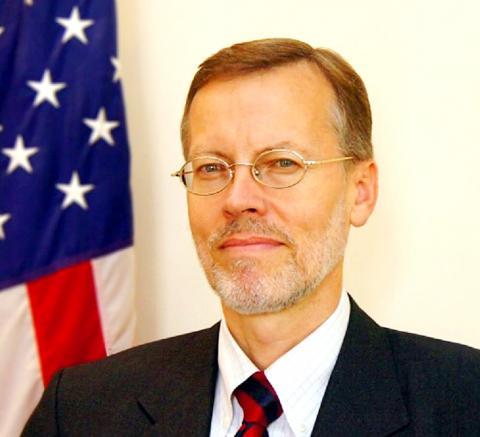The government yesterday welcomed Washington’s appointment of former American Institute in Taiwan (AIT) deputy director Brent Christensen as the new AIT director, praising him as being instrumental in the US’ implementation of several Taiwan-friendly initiatives.
The AIT announced in a press release yesterday morning that Christensen, a veteran US diplomat with nearly 30 years of service, is to succeed outgoing AIT Director Kin Moy.
Moy, the first US diplomat of Chinese descent to head the AIT’s Taipei office, is expected to leave next month the post he has occupied since June 2015, but the AIT has yet to release a specific date for his departure.

Photo: screen grab from the US Department of State Web site
Presidential Office spokesman Sidney Lin (林鶴明) said Christensen is a senior diplomat with a solid resume and is well-versed in US-Taiwan relations.
“During his tenure as director of the US Department of State’s Office of Taiwan Coordination from 2010 to 2012 and deputy director of the AIT from 2012 to 2015, Christensen had made every possible effort to further Taiwan-US ties. He was also involved in several initiatives vital to bilateral relations,” Lin said.
Following the completion of the AIT’s new compound in Taipei’s Neihu District (內湖), which cost the US government US$255.6 million and serves as a significant milestone in Taiwan-US relations, Lin said he hoped to see bilateral ties and cooperation between Taiwan and US reach new heights under Christensen’s leadership.
Lin also expressed the government’s gratitude to Moy for his dedication to the development of Taiwan-US ties over the past three years.
Moy was earlier this month given the Grand Medal of Diplomacy, the highest honor Taiwan gives to an individual for diplomatic contributions.
“Recent progress in Taiwan-US relations serves as a testament to the concrete foundations that have been laid down by all of the AIT’s previous directors. We will continue to further bilateral partnership based on these foundations,” Lin said.
Meanwhile, the Ministry of Foreign Affairs also welcomed the appointment of Christensen, who it said has an in-depth understanding of major issues concerning Taiwan and the US, as well as the government’s policy stance.
Christensen has played a role in Washington’s implementation of several Taiwan-friendly initiatives, the ministry said, citing as examples Taiwan’s inclusion in the US’ Visa Waiver Program in 2012, the signing of a new version of the Agreement on Privileges, Exemptions and Immunities between the AIT and the Taipei Economic and Cultural Representative Office in the US in 2013, and the establishment of the US-Taiwan Global Cooperation and Training Framework in 2015.
He has also facilitated visits by high-level US officials to Taiwan, including then-US environmental protection agency administrator Gina McCarthy in 2014 and then-US assistant secretary of state for economic and business affairs Charles Rivkin in 2015, the ministry said.
“The ministry looks forward to Christensen’s inauguration and to working closely with him to further the Taiwan-US partnership based on the foundations laid down by Moy and his predecessors,” it said.
Asked when Christensen would take office, the AIT said the date would be announced in the near future.

‘ABUSE OF POWER’: Lee Chun-yi allegedly used a Control Yuan vehicle to transport his dog to a pet grooming salon and take his wife to restaurants, media reports said Control Yuan Secretary-General Lee Chun-yi (李俊俋) resigned on Sunday night, admitting that he had misused a government vehicle, as reported by the media. Control Yuan Vice President Lee Hung-chun (李鴻鈞) yesterday apologized to the public over the issue. The watchdog body would follow up on similar accusations made by the Chinese Nationalist Party (KMT) and would investigate the alleged misuse of government vehicles by three other Control Yuan members: Su Li-chiung (蘇麗瓊), Lin Yu-jung (林郁容) and Wang Jung-chang (王榮璋), Lee Hung-chun said. Lee Chun-yi in a statement apologized for using a Control Yuan vehicle to transport his dog to a

Taiwan yesterday denied Chinese allegations that its military was behind a cyberattack on a technology company in Guangzhou, after city authorities issued warrants for 20 suspects. The Guangzhou Municipal Public Security Bureau earlier yesterday issued warrants for 20 people it identified as members of the Information, Communications and Electronic Force Command (ICEFCOM). The bureau alleged they were behind a May 20 cyberattack targeting the backend system of a self-service facility at the company. “ICEFCOM, under Taiwan’s ruling Democratic Progressive Party, directed the illegal attack,” the warrant says. The bureau placed a bounty of 10,000 yuan (US$1,392) on each of the 20 people named in

The High Court yesterday found a New Taipei City woman guilty of charges related to helping Beijing secure surrender agreements from military service members. Lee Huei-hsin (李慧馨) was sentenced to six years and eight months in prison for breaching the National Security Act (國家安全法), making illegal compacts with government employees and bribery, the court said. The verdict is final. Lee, the manager of a temple in the city’s Lujhou District (蘆洲), was accused of arranging for eight service members to make surrender pledges to the Chinese People’s Liberation Army in exchange for money, the court said. The pledges, which required them to provide identification

INDO-PACIFIC REGION: Royal Navy ships exercise the right of freedom of navigation, including in the Taiwan Strait and South China Sea, the UK’s Tony Radakin told a summit Freedom of navigation in the Indo-Pacific region is as important as it is in the English Channel, British Chief of the Defence Staff Admiral Tony Radakin said at a summit in Singapore on Saturday. The remark came as the British Royal Navy’s flagship aircraft carrier, the HMS Prince of Wales, is on an eight-month deployment to the Indo-Pacific region as head of an international carrier strike group. “Upholding the UN Convention on the Law of the Sea, and with it, the principles of the freedom of navigation, in this part of the world matters to us just as it matters in the